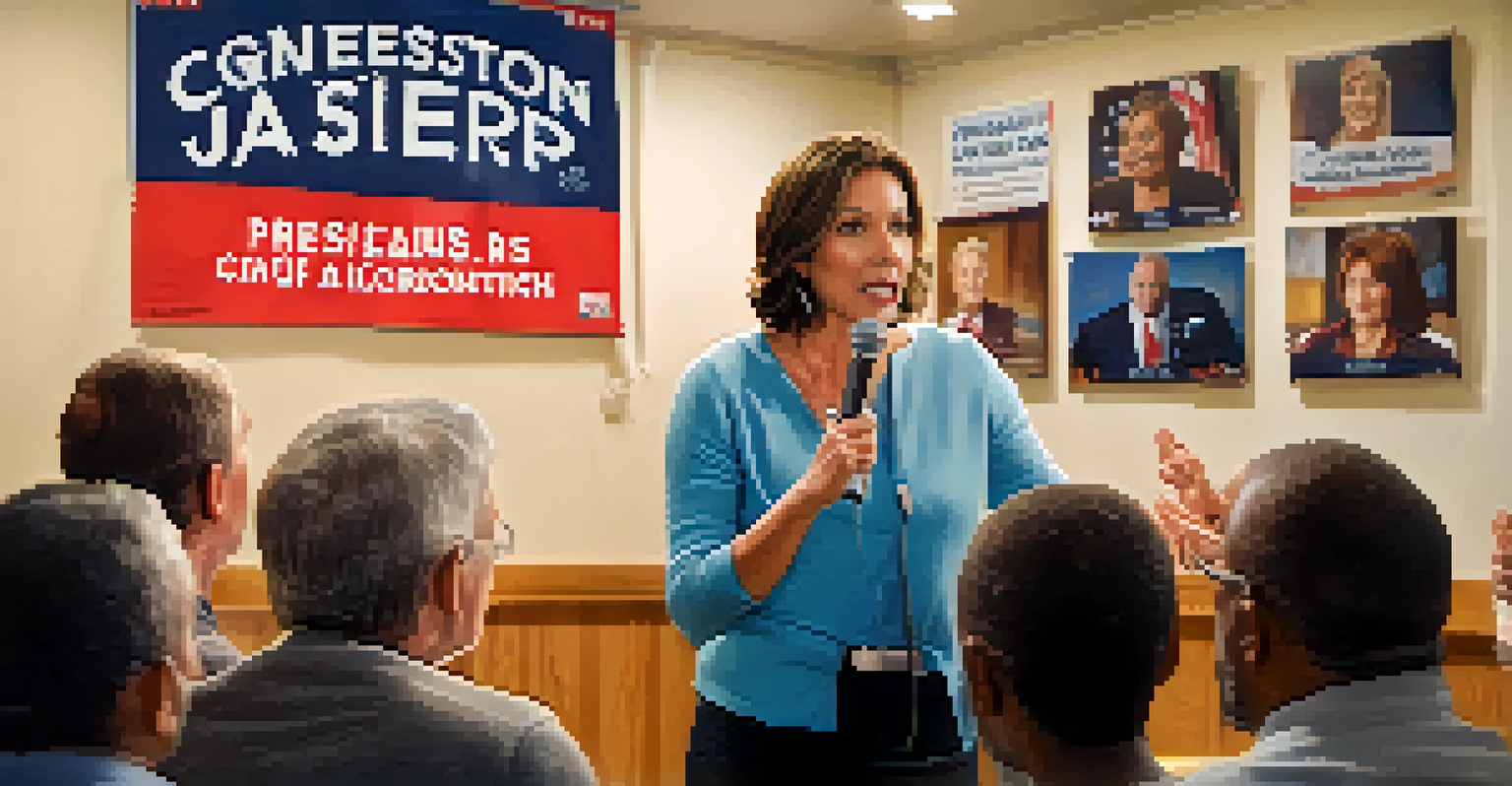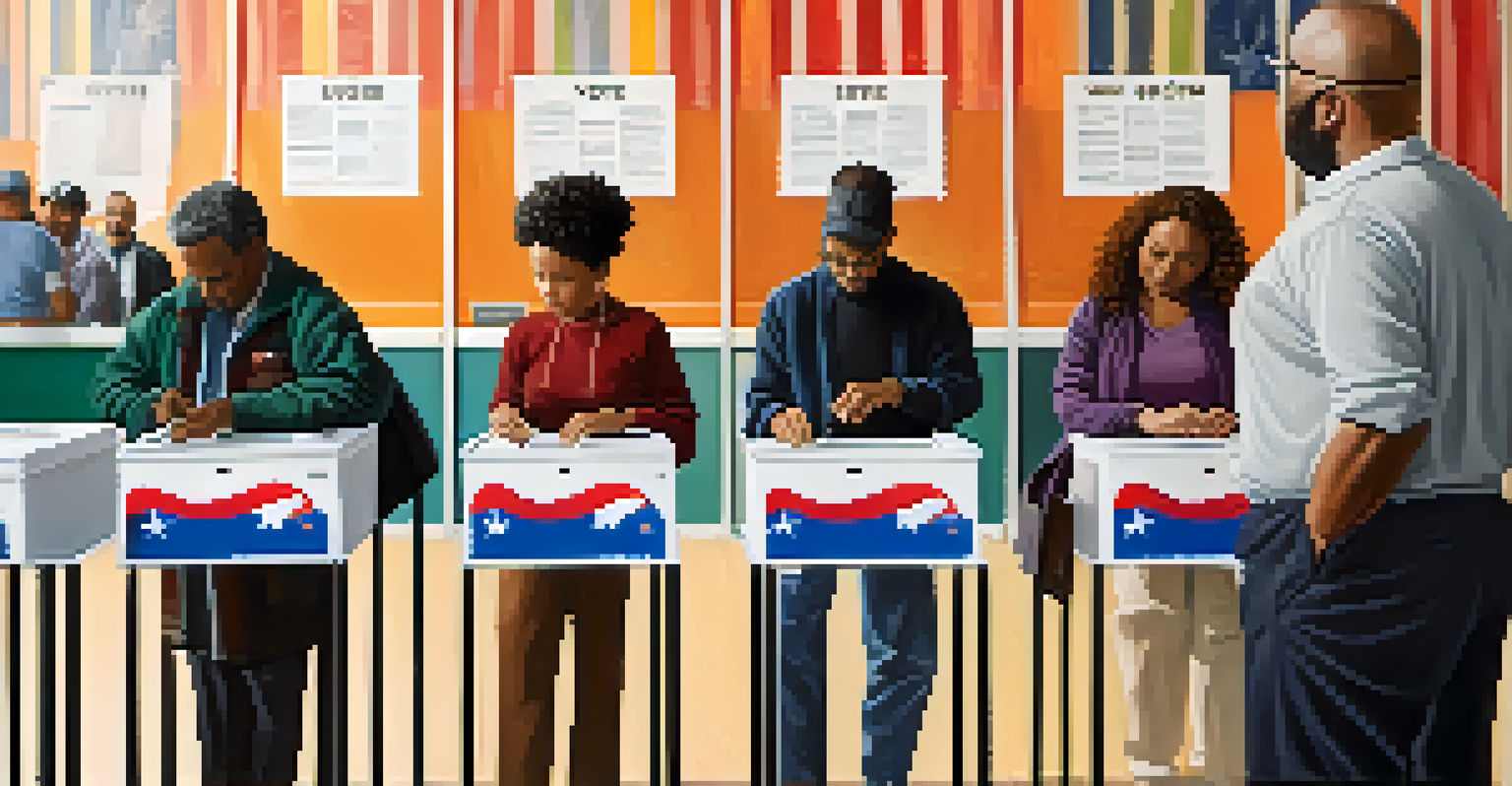The Influence of National Politics on Georgia's Local Elections

Understanding the Connection Between National and Local Politics
National politics often serve as a backdrop for local elections, influencing voter sentiment and priorities. When citizens engage with national issues, they frequently bring those concerns to local ballots. This interconnectedness creates a ripple effect, where local candidates must align their platforms with national narratives to gain support.
Politics is local, and the issues facing communities are often intertwined with national debates.
For instance, a local mayoral candidate might emphasize their stance on healthcare reform, mirroring national debates. This alignment not only resonates with voters but also helps candidates to appear relevant in a larger political context. It’s a strategy that many candidates adopt, recognizing that local issues cannot be viewed in isolation from national trends.
Ultimately, understanding how national politics filter down to local levels helps voters make informed choices. When citizens grasp these connections, they are more equipped to evaluate candidates based on their ability to address both local and national issues.
Key National Issues Shaping Local Elections in Georgia
Several national issues have a significant impact on local elections in Georgia, including immigration, education, and healthcare. For example, debates over immigration policy can sway local elections, as communities grapple with how these policies affect their residents. Candidates often find themselves tailoring their messages to address these pressing concerns.

In education, national policies around funding and curriculum can lead to heated discussions at the local level. Candidates may advocate for changes that reflect national trends, such as increased funding for public schools or the adoption of new educational standards. This approach not only aligns with broader discussions but also addresses the specific needs of local constituents.
National Politics Shape Local Elections
Local candidates align their platforms with national issues to resonate with voters and build support.
Healthcare remains a pivotal topic, especially as national debates on healthcare reform continue to evolve. Local candidates may leverage these discussions by proposing solutions that mirror national initiatives, thus building credibility and trust with voters who are concerned about their health and wellbeing.
The Role of Political Parties in Local Elections
Political parties play a crucial role in shaping local elections, often reflecting national party ideologies. In Georgia, local candidates typically align themselves with either the Democratic or Republican Party, making it essential for them to adopt party platforms. This alignment can be particularly advantageous in mobilizing voters who identify strongly with national party values.
In a democracy, the people get the government they deserve, and understanding national issues at the local level is crucial for informed voting.
The influence of parties extends beyond candidate selection; it also affects campaign strategies. Local candidates may receive support in the form of funding, volunteers, and resources from their national party, which can significantly enhance their visibility and outreach. This relationship underscores the importance of party affiliation in local political contests.
As elections approach, party loyalty can often sway undecided voters, creating a dynamic where local candidates must navigate their positions carefully. The tug-of-war between local concerns and national party agendas can lead to unique campaign narratives that resonate with the electorate.
Voter Sentiment and National Political Events
Voter sentiment is heavily influenced by national political events, shaping the atmosphere in which local elections occur. For example, a contentious national election can energize or demoralize voters at the local level, affecting turnout and candidate support. Candidates must therefore be attuned to the emotional climate created by these events.
Consider how national protests or movements, such as those advocating for social justice, can rally local voters around specific issues. Candidates who effectively tap into these sentiments often find themselves gaining traction, as voters look for leaders who reflect their values and concerns. This connection between national movements and local engagement is a powerful tool in electoral strategies.
Voter Sentiment Influenced by Events
National political events energize or demoralize local voters, affecting turnout and candidate appeal.
Additionally, the rise of social media has amplified the impact of national events on local voter sentiment. Candidates can quickly respond to national crises, aligning their messages to demonstrate relevance and empathy, which can be crucial for swaying public opinion in their favor.
The Impact of Media Coverage on Local Elections
Media coverage significantly influences local elections by framing national narratives that candidates must navigate. Local news outlets often highlight national stories, which can alter public perceptions of local candidates. This spotlight means that candidates are not just running against their opponents but also responding to broader media narratives.
For instance, if national media focuses on a particular policy issue, local candidates may feel compelled to address it in their campaigns. This can lead to a situation where local elections become a microcosm of national debates, with candidates striving to appear knowledgeable and engaged. It’s a balancing act that requires keen awareness of media trends.
Furthermore, the rise of digital media has transformed how candidates communicate with voters. Social platforms allow for rapid dissemination of information, enabling candidates to respond to national events in real-time. This immediacy can bolster their campaigns, allowing them to connect with voters on issues that matter to them.
Case Studies: National Politics in Recent Georgia Elections
Examining recent elections in Georgia provides insight into the influence of national politics. For example, the 2020 elections showcased how national issues, such as the COVID-19 pandemic and racial justice protests, shaped local races. Candidates who addressed these topics effectively often garnered greater support from a mobilized electorate.
In the 2022 midterm elections, the national narrative around voter suppression had a profound effect on local campaigns. Candidates who actively promoted voting rights resonated with voters who were concerned about these issues, illustrating the direct impact of national conversations on local races. This case underscores the importance of aligning local issues with national movements.
Media Highlights National Narratives
Media coverage of national stories influences public perception of local candidates, requiring them to adapt their campaigns.
These case studies highlight the dynamic interplay between national politics and local elections, revealing how local candidates navigate broader political landscapes to connect with their constituents. By understanding these influences, we can better appreciate the complexities of voting behavior in Georgia.
Looking Ahead: The Future of Local Elections in Georgia
As national politics continue to evolve, their influence on local elections in Georgia is likely to persist. Candidates must remain vigilant, adapting their messages to reflect both local needs and national trends. This adaptability will be key to engaging voters who are increasingly aware of the interconnectedness of issues.
Moreover, the growing involvement of grassroots movements and community organizations can shape the future of local elections. These groups often reflect national issues while focusing on local solutions, encouraging candidates to prioritize community engagement. This shift could lead to a more dynamic political landscape, where local voices are amplified.

In conclusion, the future of local elections in Georgia will depend on how well candidates can navigate the terrain created by national politics. By staying attuned to both local concerns and national narratives, candidates can foster deeper connections with voters, paving the way for more impactful and relevant campaigns.